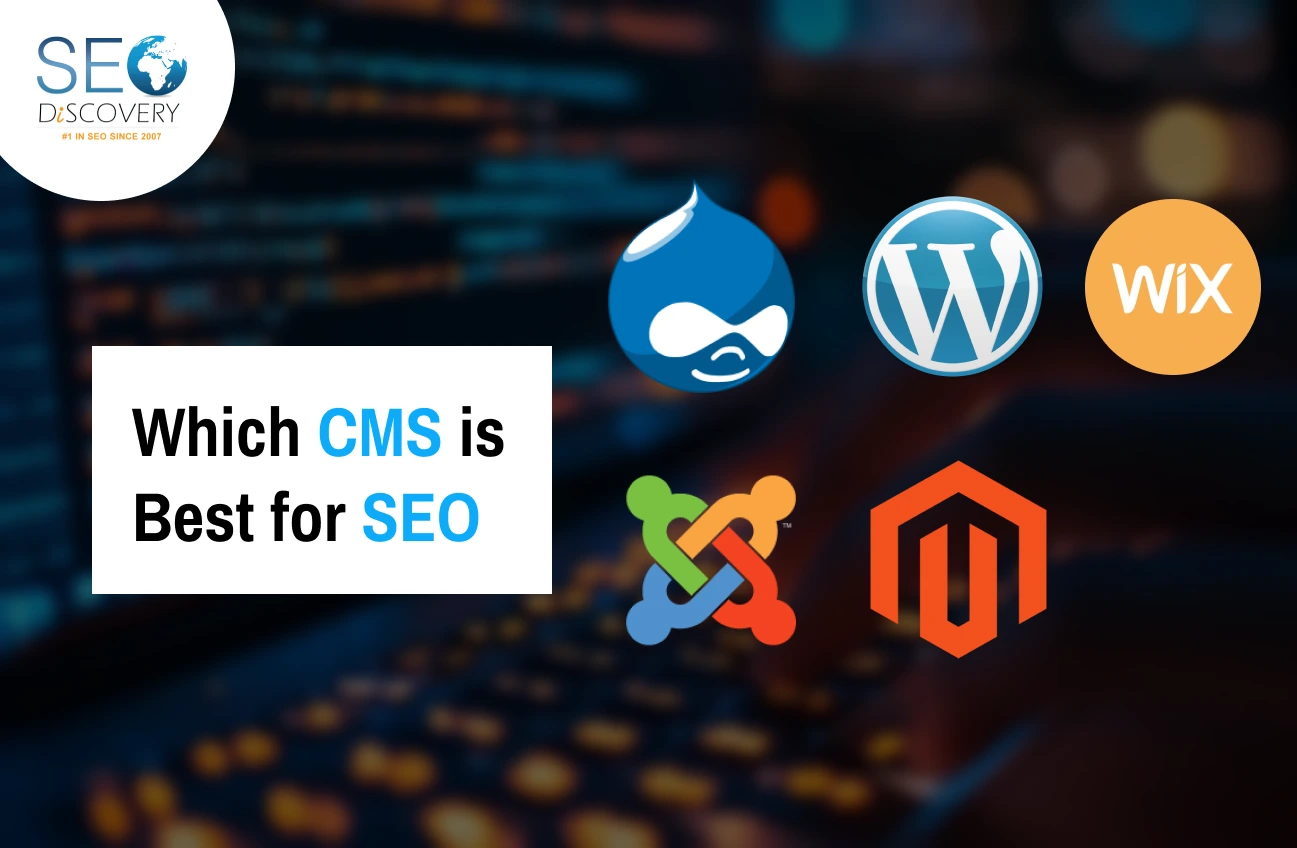Your CMS Could Be Holding Your Website Back—Here’s Why
Did you know that 53% of users leave a site if it takes more than 3 seconds to load? And with Google prioritizing page experience, the CMS you choose can make or break your SEO efforts.
43% of all websites run on a CMS, yet not all platforms are created equal when it comes to SEO. For example, websites using SEO-optimized CMS platforms see 2.5x more organic traffic than those that don’t. Meanwhile, 60% of marketers say technical SEO challenges—like slow load times or poor mobile responsiveness—stem directly from their CMS limitations.
A well-optimized CMS can boost your rankings by improving site speed, mobile-friendliness, and structured data implementation. In fact, websites with a strong technical foundation are 4.42 times more likely to rank higher in search results.
With Google’s Core Web Vitals now dictating search rankings and mobile-first indexing impacting 70% of global sites, your CMS isn’t just a tool—it’s the backbone of your SEO strategy.
So, what is the best CMS for SEO? Choosing the right platform can significantly impact your site’s performance, rankings, and overall digital success.
Worry not! In this guide, we’ll compare the top CMS platforms to help you make the right choice.
Table Of Contents
- What CMS is the Best for SEO? Understanding CMS and Its Role in SEO
- Why Your CMS Is the Backbone of Your SEO Strategy
- 5 Must-Have Features of an SEO-Friendly CMS
- Best CMS for SEO: Top Platforms Compared
- Custom CMS SEO Migration - When to Switch
- So, What is the Best CMS for SEO?
- Frequently Asked Question About Which CMS is Best for SEO
What CMS is the Best for SEO? Understanding CMS and Its Role in SEO
A content management system (CMS) is a computer program that enables users to create, edit, and update website content without the need of coding skills. The relationship between CMS and SEO is very important since search engines favor websites that are fast, well structured, and offer a great user experience.
When selecting a CMS for SEO, several factors must be considered, including URL structures, meta tag customization, schema markup integration, mobile responsiveness, and security. The right SEO CMS will ensure that your website meets these requirements and performs well in search engine rankings.
Why Your CMS Is the Backbone of Your SEO Strategy
Your CMS is not just a tool for publishing blogs or updating product pages, it is the engine that powers technical SEO, user experience, and content stability – three pillars that directly influence search rankings.
Technical SEO: A CMS optimized for SEO automates critical tasks like generating XML sitemaps, fixing broken links, and optimizing URL structures. Without these features, you’re left manually troubleshooting issues that drag down rankings.
User Experience: Google’s Core Web Vitals emphasize speed, mobile-friendliness, and visual stability. A CMS that incorporates these into its DNA (consider caching plugins or mobile-first themes) puts you ahead of the game.
Scalability: As your website expands, a top SEO CMS platform expands with you. Enterprise-level platforms such as Drupal support thousands of pages without even breaking a sweat, whereas rigid systems crack under the pressure.
Example: Since moving to WordPress, HubSpot increased organic traffic by 40% in six months due to its powerful SEO plugins and responsive design.
Optimize Your Platform for Better Rankings, Faster Speed, and Seamless Scalability.
5 Must-Have Features of an SEO-Friendly CMS
Not all CMS platforms are created equal. To dominate search rankings, your CMS Needs these non-negotiable features:
1. Built-In SEO Tools
Look for platforms with native tools for meta tags, alt text, canonical URLs, and schema markup. WordPress, for example, offers plugins like Yoast SEO that audit content in real-time and suggest fixes.
2. Speed Optimization
Google’s Page Experience update rewards fast sites. A CMS for SEO should support caching, image compression, and Content Delivery Networks (CDNs). Shopify, for instance, uses global CDNs to ensure stores load in under 2 seconds.
3. Mobile-First Design
With 70% of websites ranked via mobile-first indexing, responsive templates are non-negotiable. Wix and Squarespace automatically optimize sites for mobile, but lack deeper customization.
4. Clean Code & Crawlability
Search engines struggle with bloated code or poor navigation. Platforms like Drupal prioritize clean architecture, making it easier for bots to crawl and index pages.
5. Easy Migration & Redirect Management
A CMS migration SEO disaster can tank your rankings. The best platforms simplify URL redirects and preserve metadata during transitions.
Best CMS for SEO: Top Platforms Compared

WordPress
The Best SEO CMS for Flexibility
WordPress dominates the CMS market, powering over 40% of all websites. It offers extensive customization options and is widely regarded as the best SEO CMS platform due to its powerful plugins and optimization capabilities.
WordPress excels in CMS SEO optimization through plugins like Yoast SEO, Rank Math, and All in One SEO. These tools allow users to customize meta titles, descriptions, sitemaps, and structured data, making it easier to enhance search visibility. The platform also supports SEO-friendly themes, fast-loading pages, and mobile optimization, which are crucial for ranking well on Google.
However, WordPress does require ongoing maintenance, including plugin updates, security patches, and performance optimization. Without proper management, it can become slow, which could negatively impact SEO rankings.
WordPress Pros:
- Extensive SEO plugin options (Yoast SEO, Rank Math, All in One SEO)
- Fully customizable for advanced SEO needs
- SEO-friendly themes and mobile optimization
- Easy integration with various tools (Google Analytics, Schema Markup)
- Strong community support and regular updates

Shopify
Best SEO CMS for eCommerce
Shopify is a leading eCommerce CMS that comes with built-in SEO features. Its structured architecture ensures clean URLs, automatic sitemap generation, and SSL security, making it a strong contender for the best SEO CMS for online stores.
Shopify also provides mobile-friendly themes, structured data for rich snippets, and fast-loading pages. However, the platform has some limitations when it comes to advanced technical SEO, requiring third party apps for enhanced functionalities. Unlike WordPress, Shopify does not offer complete control over elements such as server configurations or URL structures, which can limit SEO customization.
Shopify Pros:
- Built-in SEO features (clean URLs, automatic sitemap, SSL security)
- Mobile-friendly themes and fast-loading pages
- Structured data support for rich snippets
- Secure and reliable hosting with automatic updates
- Easy-to-use interface, ideal for non-technical users

Joomla
A balanced CMS for SEO
Joomla is another popular CMS for SEO, offering a balanced approach between customization and ease of use. It provides better built-in SEO tools compared to some competitors and allows for customizable URL structures, metadata management, and structured content organization.
One of Joomla’s key strengths is its advanced user permissions and security features, which makes it ideal for businesses that require a scalable and secure platform. However, Joomla has a steeper learning curve compared to WordPress, and the availability of SEO plugins is limited.
Joomla Pros:
- Built-in SEO tools for metadata and URL customization
- Advanced security and access control for larger businesses
- Flexible content management with structured organization
- Multilingual support for global reach
- Better performance than some CMS options due to its lightweight framework

Drupal
Best SEO CMS for Large Websites
Drupal is a powerful CMS SEO optimized platform designed for large enterprises and high-traffic websites. It offers exceptional customization capabilities, including advanced caching mechanisms, flexible URL structures, and an efficient content taxonomy system.
The platform is built for high performance and security, making it a great option for organizations handling sensitive data. However, Drupal is not beginner-friendly and requires technical expertise to fully utilize its SEO potential. Unlike WordPress, where SEO optimization can be managed with plugins, Drupal demands manual configurations and development expertise.
Drupal Pros:
- High-performance capabilities for large and complex websites
- Flexible URL structures and advanced content taxonomy
- Advanced caching mechanisms for better page speed
- Strong security features, ideal for enterprises handling sensitive data
- Scalable for businesses with extensive growth plans

Wix
A Beginner-Friendly SEO CMS
Wix is often considered a best SEO friendly CMS for beginners due to its intuitive drag-and-drop interface and built-in SEO features. It provides automatic SEO-friendly elements like clean URLs, mobile optimization, and meta tag editing.
Additionally, Wix offers AI-powered suggestions, making it an excellent choice for small businesses and personal websites. However, it does not provide as much control over technical SEO aspects like structured data customization, advanced redirects, and server configurations, making it less suitable for large websites or businesses with complex SEO needs.
Wix Pros:
- Easy-to-use drag-and-drop interface, ideal for beginners
- Built-in SEO tools with AI-powered suggestions
- Automatic clean URLs, meta tag editing, and mobile optimization
- No need for external hosting, making it a hassle-free option
- Great for small businesses and personal projects

Magento
Best CMS for SEO in eCommerce
Magento is another robust Best CMS SEO solution, primarily designed for large scale eCommerce businesses. It supports SEO-friendly URL structures, advanced metadata control, and structured data integration, helping online stores gain better visibility in search results.
Magento is highly scalable and customizable but requires technical expertise to configure properly. It demands significant resources in terms of hosting, maintenance, and development, which can make it costly for small businesses. However, for enterprises looking for a CMS and SEO powerhouse, Magento is an excellent choice.
Magento Pros:
- SEO-friendly URL structures and advanced metadata control
- Strong eCommerce capabilities with scalability for large businesses
- Customizable SEO strategies with structured data integration
- Advanced performance optimization features for fast-loading pages
- Robust security features and enterprise-level functionality
Custom CMS SEO Migration - When to Switch
If your current CMS is hindering your search rankings, you may need to consider a CMS migration SEO strategy. Moving to a more SEO friendly CMS can significantly improve your website’s performance, but the migration process must be handled carefully.
A custom CMS SEO migration should include:
- 301 redirects to maintain existing rankings and prevent broken links
- Preserving metadata and structured data to retain SEO value
- Ensuring mobile-friendliness and page speed optimization
- Conducting a full SEO audit before and after migration
- Testing on Google Search Console to identify and resolve issues
Switching to a CMS SEO optimized platform can be beneficial, but failing to plan the migration correctly can lead to traffic loss and ranking drops. Consulting with an SEO expert is recommended when migrating your CMS.
So, What is the Best CMS for SEO?
After evaluating various CMS options, WordPress remains the best SEO CMS platform due to its flexibility, extensive plugin ecosystem, and ease of optimization. It provides a comprehensive set of tools for SEO success, making it ideal for businesses, bloggers, and enterprises alike.
For eCommerce stores, Shopify and Magento are excellent choices, depending on your business size and technical capabilities. Drupal and Joomla cater to users who require advanced customization, while Wix is a good option for beginners seeking a simple and SEO friendly CMS.
Key Takeaways:
- WordPress – Best all-rounder for SEO
- Shopify – Best for eCommerce SEO
- Drupal – Best for complex websites with high customization
- Joomla – A solid balance between SEO and security
- Magento – Best SEO friendly CMS for large eCommerce stores
If these options don’t fully align with your needs, you can opt for a custom-built CMS designed specifically for your requirements. Working with a trusted digital marketing agency like SEO Discovery ensures your CMS is fully optimized for SEO, user experience, and sustainable growth.
Struggling to Find the Best CMS for SEO? Let Us Help You Choose the Right Platform
FAQs About What Is the Best CMS for SEO
WordPress is widely considered the best CMS for SEO due to its flexibility, extensive plugin support, and SEO-friendly features. However, the best choice depends on your specific needs—Shopify is great for eCommerce, while Drupal is ideal for large, complex websites.
WordPress offers more advanced SEO customization options through plugins like Yoast SEO and Rank Math, making it a strong choice for content-heavy websites. Shopify, on the other hand, is optimized for eCommerce SEO with built-in features, but it has some limitations in URL structure and customization.
No, most modern CMS platforms provide user-friendly SEO tools that allow non-technical users to optimize their websites. However, platforms like Drupal and Magento may require technical expertise for advanced SEO customization.
Yes, migrating to a better CMS for SEO is possible and often beneficial. However, to prevent ranking drops, ensure proper 301 redirects, metadata preservation, and structured data integration. Consulting with SEO experts can make the process smoother.
An SEO-friendly CMS should include:
- Customizable URL structures
- Meta tag and schema markup support
- Fast page loading speeds
- Mobile responsiveness
- Built-in SEO tools or plugin support
- Secure and reliable hosting
Wix has improved its SEO capabilities with built-in tools and AI-powered suggestions, making it a decent option for beginners and small businesses. However, it lacks the advanced customization and flexibility offered by platforms like WordPress or Drupal.
A CMS affects technical SEO, user experience, and content scalability—all of which influence rankings. A well-optimized CMS ensures fast loading speeds, proper indexing, structured URLs, and mobile responsiveness, all of which improve search engine rankings.
Yes, if existing CMS platforms don’t fully meet your needs, you can develop a custom CMS tailored for SEO. Partnering with an experienced digital marketing agency like SEO Discovery can help you create a CMS optimized for performance, security, and search visibility.


